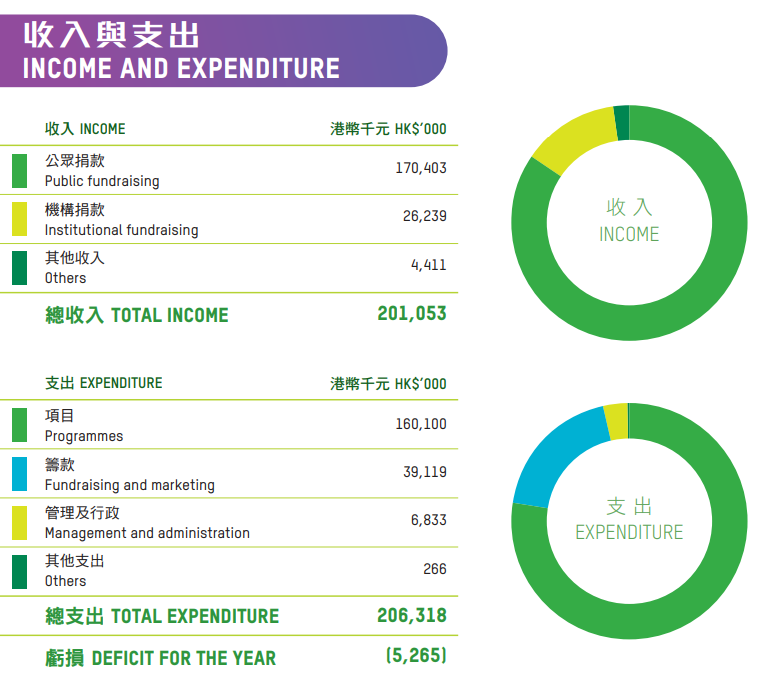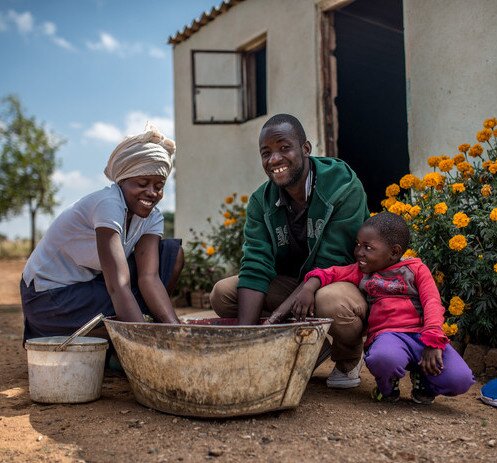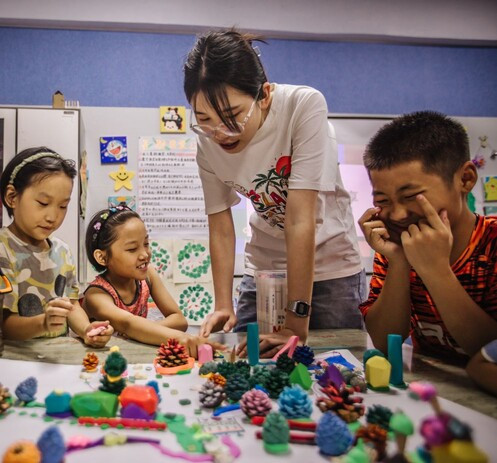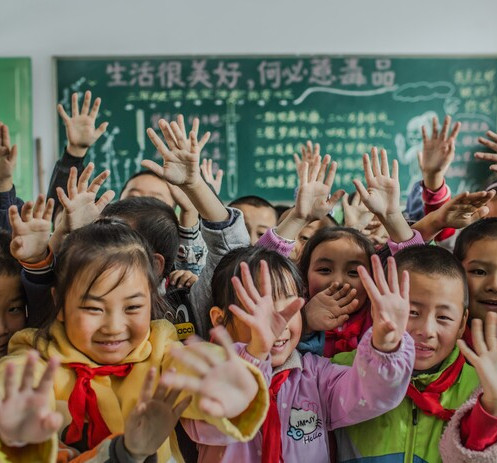In 2024/25, Oxfam Hong Kong (OHK):
- Worked in 23 countries and regions together with 183 partner organisations.
- Reached over 2,800,000 people in poor communities through the 259 projects we supported.
- Supported 46 projects in Hong Kong and reached over 24,900 people. We also published 6 research reports, position papers and responses to advocate for pro-poor policies, and conducted 222 workshops to nurture global citizens.
- Spent HK$160,100,000 to fight poverty through our programmes.
The programme expenditure for the year reached HK$160 million. Management and administration costs – the costs required to run and maintain our organisation – represented 3% of our total expenditure this year. These expenses contributed to our organisation’s governance, financial management, information technology systems, audit and legal services.
Most of our donors are members of the public, and many give what they can every month. Our monthly donors provide us with a high degree of autonomy, flexibility, integrity and stability, and we provide them with regular updates, reports, invitations to workshops, and an annual gathering with our staff where they learn more about our impact.
OHK does not receive regular funding from the Hong Kong SAR Government. We only receive one-off funding for specific emergency efforts, and we apply those funds from the Hong Kong SAR Government Disaster Relief Fund (DRF). During the 2024/25 financial year, the DRF granted us a total of HK$19 million to provide emergency relief to disaster affected people in Bangladesh, Nepal, Vietnam and the Chinese Mainland.
OHK is also not a subsidiary of an international body. We are an independent development and relief agency based in Hong Kong. We do not receive regular funding from any overseas headquarters. Funding support from Oxfam affiliates generally only comes for specific projects.
To be transparent and accountable, we have prepared this FAQ on how OHK uses donations.
If you have any question, please contact us
| (852) 3120 5000 | [email protected] |
Financial Highlights

These financial highlights are based on Oxfam Hong Kong's financial accounts for the year ended 31 March 2025. The full audited financial statement by KPMG can be downloaded here. All figures are in Hong Kong dollars. Read our annual reports to learn more about how we use donations to empower those in poor communities in Hong Kong and around the world to become self-reliant.
FAQ
A. For programmes with poor people in Hong Kong, Chinese Mainland and overseas, monitoring and evaluation procedures are an important part of an integrated cycle of activity.
- The cycle includes a needs assessment, project plan development, an appraisal, implementation, monitoring, and the evaluation of projects.
- Each stage is conducted by colleagues of Oxfam, together with our partners and the beneficiaries themselves.
- External consultants evaluate the impact as needed.
- Professionals from like-minded organisations help conduct peer reviews as needed.
- Financial accountability procedures are managed by colleagues at our field offices in several countries and by the colleagues at the head office in Hong Kong.
B. When we make a public appeal for a specific humanitarian disaster, after deducting the direct fundraising cost, all donations raised from the public go to the urgent work at hand.
- When Oxfam Hong Kong responds to an emergency and makes a public appeal, we set up a separate bank account. We cover core operational costs from our central funds. After deducting the direct fundraising cost for the appeals, all donations raised go to relief and rehabilitation projects, including the respective programme monitoring and management costs.
- A programme management system ensures that the money is spent on the emergency: from supplying urgently needed relief items to rebuilding homes and community infrastructures and restoring people livelihoods, all in a sustainable way. This management system includes an assessment of needs, appraisals of project proposals, the monitoring of the expenditure, and the preparation of progress reports. One practical policy in place is that relief items are sourced as locally as possible – this supports the local people affected by the crisis and reduces transportation and other logistical costs.
- Auditor's reports are produced for any grant contributed by the DRF. Unspent funds granted by the fund are returned to the government.
- Should there be any unused donations from the emergency appeal, Oxfam Hong Kong will use the funds for other emergency, rehabilitation or community development work in other countries and regions.
C. Oxfam Hong Kong's governing bodies – the Council and Executive Committee – are made up of community members who volunteer their time and expertise.
These community members guide our staff in implementing projects and in monitoring the expenditure of the projects. Our colleagues report to the Council and Executive Committee via unit reports, financial statements and audit reports.
The Council approves and monitors year plans, budgets, and mid-year and annual financial reviews, sets guidelines on fundraising and grants, and monitors whether these guidelines are being observed; the Executive Committee, appointed by the Council, makes executive decisions.
D. Our Reserve Policy requires us to hold general reserves equivalent to three to six months of total unrestricted expenditures to provide leeway for any significant and unexpected downturn in revenues, to ensure that programmes can continue as planned.
E. Oxfam Hong Kong is legally registered in Hong Kong and must abide by Hong Kong law. Our programmes launched elsewhere must also follow the laws of the respective countries.
Oxfam is committed to ensuring that every donation is used effectively. We manage resources prudently and continuously review and improve our internal policies and procedures to uphold trust and accountability. In FY2024/25, our total programme expenditure reached HK$160 million. Working in 23 countries and regions together with 183 partner organisations, we implemented 259 projects, supporting over 2,800,000 people in poor communities.
Oxfam Hong Kong complies with the Oxfam Confederation Financial Standards and the International Non-Governmental Organisations Accountability Charter. Management and administration expenses cover the organisation’s governances, financial management and information technology systems, audit and legal services.
External Audit
The financial statements of Oxfam Hong Kong are audited in accordance with the Hong Kong Standards on Auditing, issued by the Hong Kong Institute of Certified Public Accountants. Each year, our external auditor forms an independent opinion on whether the financial statements give a true and fair view of the state of Oxfam’s affairs, and of its surplus/deficit of income over expenditure and cash flows, in accordance with the Hong Kong Financial Reporting Standards. It also forms an opinion on whether these have been properly prepared in accordance with the Hong Kong Companies Ordinance.
Internal Audit
Oxfam has established the internal audit function aimed at providing assessments of its internal processes. The establishment of the internal audit function enables Oxfam to evaluate and improve the effectiveness of its risk management practices, control framework and governance processes. Such function reports directly to the Finance and Audit Committee of the Council, which is chaired by an honorary treasurer.
Oxfam Hong Kong communicates details of its use of funds through various channels, such as:
- Our publications (annual reports, Oxfam Express and our Feature Stories)
- Our main web site and microsites (e.g. Oxfam Trailwalker)
- Articles in the mass media
- Direct mailing materials
- Trips to project sites for supporters (e.g. volunteers, Trailwalkers, and monthly, major and corporate donors)
- The Oxfam Supporters Gathering (for donors and volunteers)
To encourage donations, the Hong Kong SAR Government exempts up to 35 per cent of assessable income or profits on donations to recognised charitable organisations. Oxfam Hong Kong is one of these organisations. If your total donation (in money terms) for the year exceeds HK$100, your contribution(s) to Oxfam Hong Kong are tax-deductible as per the Inland Revenue Ordinance.



